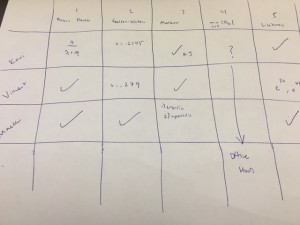Around this time last year, I took my first final exams at Princeton. Like many other freshmen, I left exam rooms in disbelief of how hard tests were, especially in some of my more quantitative classes. The time constraints, the amount of material covered, and the insightfulness required to answer questions always make Princeton exams challenging – something that every student learns quickly.
But what I didn’t pick up on was the incredible advantage of having a study group. In high school, exams weren’t as difficult, and consequently, I could get through classes by studying alone. I would sit in my room, take in all the material days before an exam, and feel confident that I knew it. During my first year at Princeton, I tried to emulate this same strategy but would just end up feeling overwhelmed. And for a long time, I couldn’t pinpoint any solutions to my stress.

Inspiration came during office hours last spring, when my friend and I went to pick up our math exams. Our instructor remarked that between us, we solved all of the problems on the test, even though individually we hadn’t performed as well. While walking back to my dorm, I thought about this more. If my friend and I had simply taken the time to study together, we would’ve not only done better on the test, but also thoroughly learned the material.
Since that day, I’ve sought out a reliable study group in all my classes – and it sure has paid dividends. This week I’m meeting with a different study group each day to review material before my final exams. In some ways, I find that our discussions are more useful than lecture style review sessions held by preceptors and TAs. I can think of several great advantages to creating study groups:
The first is the quantity of knowledge gained. Everyone in the study group has access to every individual’s knowledge about the particular subject. This is especially helpful when working on practice problems in math or science classes. If I don’t understand a particular solution, there’s a good chance one of my study group members can explain it to me. And by explaining ideas to other people, I gain a more in-depth knowledge of the material myself. This is helpful even beyond the exam — discussing concepts out loud helps those concepts become more permanent in your memory.

Second is the time-efficiency. Together as a group, we can pinpoint major concepts and take-aways from each unit of the material – which makes blueprinting (see Quick and Dirty Blueprinting) or creating study plans much more efficient. We can even split up the main concepts and present them to each other if everyone does their individual part. This especially helps in exams that allow cheat sheets. I often compare my cheat sheet with my study group friends’ before the exam so I will have more tools to tackle exam questions.
And lastly, it’s a great way to brainstorm any questions you might have about the material, including potential applications beyond what’s presented in class and even future research questions that you might be interested in pursuing. I like to think of working in a study group as generating a “marketplace of ideas” – a metaphor used by philosopher John Stuart Mill way back in 1859 to affirm the value of multiple voices. When people bounce ideas off of each other and there is healthy collaboration, everyone learns more. By comparing different approaches to problems, a group can discover the most efficient or elegant solutions. The possibilities are endless!
— Kavi Jain, Engineering Correspondent

